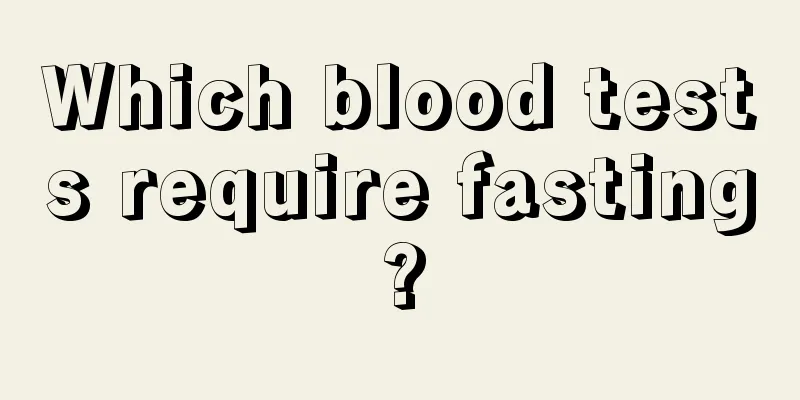Which blood tests require fasting?

|
When some people go to the hospital for a blood test, the doctor will tell you to fast and not eat any food or drink any water. In fact, blood tests are very important, but blood tests also contain a lot of content. Why do you have to fast for blood tests? In fact, you must pay attention to some examination items during the fasting examination. For example, you must know the many fasting examination items mentioned below. Let's take a simple look at which blood tests require fasting. The items that generally require fasting blood tests in the morning include: 1. Various blood chemistry tests. Blood glucose, total blood lipids, cholesterol, triglycerides, β-lipoprotein, serum protein electrophoresis, carbon dioxide binding capacity, various serum enzymes, alpha-fetoprotein, serum immunoglobulin, mucin, etc. 2. Blood liver function test. 3. Blood renal function test. 4. Glucose tolerance test. 5. Serological and immunological examinations. Such as total complement, C3, rose petal test, antinuclear antibody, hepatitis B surface antigen, Widal reaction, antistreptolysin "O" assay, rheumatoid factor test, etc. 6. Various blood rheology tests. Such as whole blood viscosity, plasma viscosity, serum viscosity, platelet viscosity, etc. Some blood tests can be checked at any time, such as red blood cells, white blood cells, platelets, etc. Some blood tests require blood draw in the early morning on an empty stomach (without breakfast), such as kidney function, liver function, erythrocyte sedimentation rate, blood sugar, etc. This is because: 1. Avoid the influence of factors such as diet on certain components in the blood. Because food is absorbed into the blood through the gastrointestinal tract and then transported throughout the body by the blood, the concentration of certain components in the blood will increase, affecting the accuracy of the test results. 2. After eating, various digested food chylomicrons are quickly absorbed into the blood, making the blood appear turbid, usually called "fatty blood", which makes it difficult for the examiner to observe clearly. 3. Emotions are relatively stable in the early morning and the body is in a basal metabolic state. The results obtained can more truly reflect the actual situation. The so-called fasting means not eating after dinner and not having breakfast the next morning. In this case, blood test is most effective. When patients go to the hospital for examination, which blood tests require fasting? The above items require fasting for examination. In fact, fasting blood test can correctly perform the examination, and can also better check the results, and can also judge the accuracy of the test results. It is necessary to fast for blood test, which can increase the accuracy of the test results. |
<<: Which flowers are suitable for the bedroom?
>>: What are the benefits of good living habits
Recommend
How to treat lung inflammation with medicine
Pneumonia is a common disease. There are many cau...
What is endometrial cancer? Pay attention to these four points
Endometrial cancer is a common disease in perimen...
Why are there black spots floating around in my eyes?
There are black spots floating around in the eyes...
What causes primary liver cancer? There are three main causes of primary liver cancer
The harm of primary liver cancer to health cannot...
We must pay attention to the prevention of prostate cancer in a timely manner
Prostate cancer, as a common tumor disease, can c...
What are the causes of paint cover pain
After people reach the age of 35, their body func...
Acne below the collarbone
Acne occurs on many people. Different people get ...
How to fix the dough being too wet
The steamed buns we usually eat are made after th...
The difference between clams and clams
Clams are a kind of aquatic product. Clams and cl...
How to correct uneven face size
If you look closely at your face when looking in ...
Can patients be diagnosed with colon cancer by colonoscopy?
The colonoscope is mainly composed of three parts...
What biopsy results are normal
Biopsy is a commonly used medical method to detec...
The relationship between esophageal cancer and lifestyle habits
Long-term smoking and drinking are related to the...
How to clean a new pressure cooker
New pots and pans need to be cleaned after they a...









